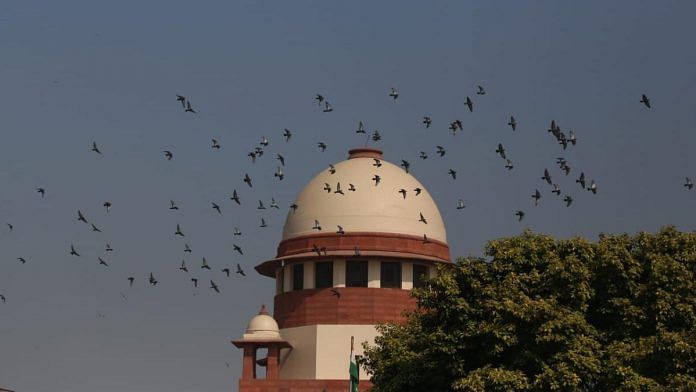New Delhi: A department-related Standing Committee on Personnel, Public Grievances, Law and Justice Friday suggested that virtual court proceedings should be allowed to continue even after the coronavirus pandemic ends, and that necessary changes in the law should be made to facilitate this.
The parliamentary committee headed by BJP MP Bhupender Yadav made this recommendation based on the observation that a courtroom is more of a public service institution than public place.
Yadav presented an interim report on the “Functioning of the Virtual Courts/Court proceedings through video conferencing” to Rajya Sabha Chairman M. Venkaiah Naidu Friday. This is the first report to be presented by any parliamentary panel on the impacts of the Covid-19 pandemic.
On grievances made by lawyers about connectivity issues, the committee said the communications ministry should “step up efforts to ensure timely implementation of National Broadband mission…so that the services provided by indigenous communication satellites are fully harnessed and the goal of Universal broadband access is achieved”.
A representative of the Bar had earlier opposed virtual court hearings on the ground that almost 50 per cent lawyers, particularly in the district courts, do not have laptops or computer facilities.
“How can we assume and presume that they would participate in these virtual courts and e-courts? So, infrastructure is a big issue in the functioning of virtual courts,” the report quoted the Bar representative.
The Supreme Court had resorted to virtual hearings on 23 March, a day before the lockdown was imposed by the government. On 6 April, a bench led by Chief Justice S.A. Bobde issued orders under Article 142 to allow all courts to switch to the virtual mode, giving legal sanctity to digital courts.
Making a strong case for virtual courtrooms, the parliamentary panel said digital hearings are cheaper and faster, besides addressing locational and economic shortcomings.
They also ensure safety of vulnerable witnesses, expedite processes, and are an improvement over traditional courts since virtual courtrooms are more affordable, people-friendly and offers greater access to justice, noted the panel.
The committee further stressed that it was time the courtrooms, which are often regarded as the last bastion of antiquated working practices, “open its doors to latest technology”.
It, however, also noted some concerns related to functioning of virtual courts such as limited access, connectivity issues and lawyers’ skills. It then requested the government to enable necessary infrastructure for integrating virtual courts into the country’s legal ecosystem.
The government representatives explained various initiatives that are being taken for putting in place a centralised infrastructure for virtual courts and to connect the district courts with it.
Also read: Analyse my judgments but don’t give colour, says retiring Supreme Court Justice Arun Mishra
‘E-Sewa Kendras in all court complexes’
The committee had held a number of meetings with secretaries from the departments of Justice and Legal Affairs, secretary general of the Supreme Court and representatives of the Bar Council of India, Delhi High Court Bar Association and the Delhi District Bar Association, while examining various issues related to the functioning of virtual courts.
The Bar representatives had expressed reservations about virtual court proceedings, and pointed to the limitations in infrastructure. They said virtual courts favour tech-savvy advocates, deprived lawyers of an opportunity to present their cases and alter course of arguments based on the changing dynamics of a case during hearings.
The committee was also informed that many advocates, mostly at the district and lower courts, lacked the skills required for virtual proceedings.
“An advocate gets to understand the mood of the judges and stands a better chance at convincing them during physical hearings. However, online hearing creates a psychological pressure on both the advocates as well as the judges…..Evidence recorded by means of video conferencing may distort non-verbal cues such as facial expressions, postures and gestures,” they pointed out.
But the committee said, “Virtual courts have their own shortcomings. However, they constitute advancement over the existing system, and therefore, on the overall, they are worth embracing.”
The panel also recommended setting up of E-Sewa Kendras in all court complexes, introduction of computer course in three and five-year law courses, developing an indigenous software platform to ensure data privacy and safety, providing WAN (Wide Area Network) facility to all, adoption of machine learning, artificial intelligence and blockchain technology, among others, for a transformational change in the dispensation of justice.
While noting that software developed by a private agency is not a viable option because it poses a major security risk, the committee recommended that the Ministry of Law and Justice as well as the Ministry of Electronics and Information Technology should address data privacy and security concerns while developing a new platform for India’s judicial system.
Also read: Supreme Court to begin physical hearing of cases in limited manner, releases SOP



